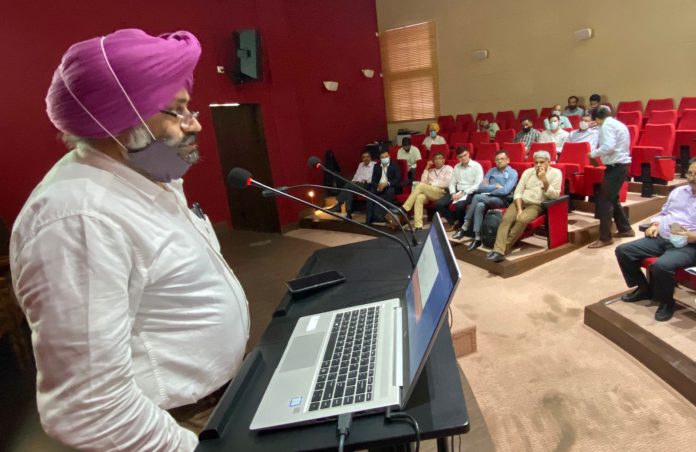
Chandigarh, August 25:
With an objective to discuss State Energy Action Plan being developed under Indo German Energy Program (IGEN) Access-II program, a Stakeholder Consultation Workshop was organized today at PEDA Office, Chandigarh with the officers from Deutsche Gesellschaft für Internationale Zusammenarbeit (GIZ), Punjab Energy Development Agency (PEDA), Pricewaterhouse Coopers Pvt. Ltd. (PWC) and 17 Government Stakeholder Departments like Department of Planning, Transport, PSPCL, PWD, Water Supply, Local Government, Housing & Urban Development.
घी खाने के फायदे || क्या ऐसा भी होता है ? || Fact Effect || EP – 3 ||
Disclosing this, an official spokesperson said that IGEN Access-II program is focused towards up scaling proven business and/or technologies for the upliftment of rural economy by ensuring access to clean, affordable & reliable energy and is aimed to address Sustainable Development Goals (SDG) 7 of UNDP (Access to Affordable, Reliable, Sustainable & Modern Energy for all) and SDG 13 (Combat Climate Change) of India’s SDG 2030 agenda.
सब कुछ पाने की चाह है तो … || Geeta saar ||
In this regard, an MoU has already been signed with GIZ & PEDA for the development of Multi-Sectoral State Energy Action Plan on dated September 23, 2020.
The Chief Executive Officer, PEDA Navjot Pal Singh Randhawa mentioned that Punjab is now being considered to play a leading role in the energy transition in India by deployment of clean and low-carbon solutions and renewable energy in part of the NAPCC for transition to renewable Energy Systems and also to fulfil renewable purchase obligations. At the state level, he stressed upon the dynamics of industry, transport, domestic, commercial and agriculture sectors are bringing new opportunities adding that energy is slowly transitioning to be demand driven than supply driven. Such shifting patterns would push the state to redefine the way energy sector operates on a day-to-day basis through utilizing higher cleaner and low-carbon power generation, providing low-carbon heating and cooling for domestic and commercial demand sectors, providing clean cooking fuels, increasing energy access to rural areas, modernizing agriculture practices amongst others, added the CEO.
Aaj ka Rashifal || आज का राशिफल || 25 August 2021
On the occasion, Director, PEDA M.P. Singh emphasized on the continuous efforts to translate energy sector strategies into actionable low-carbon solutions are driven by the Punjab Energy and Development Agency (PEDA) to increase the utilization of clean and low-carbon energy. He also divulged that with renewable energy share currently standing at only 12.5% of the total energy needs, the state has proactively committed to increase the share to 30% by 2030 through the Punjab Vision Document 2030 strategy. The vision not only focuses on the energy generation side, but also stresses the need for demand side interventions across various sectors. Long-term targets and plans on small hydel, biomass, cogeneration, Solar PV, biogas and energy efficiency improvements across sectors has been indicated in the vision. In addition, efforts are also required to assess potential penetration of newer technologies such as electric vehicles (EV), carbon, capture, storage and utilisation, hydrogen that could invariably impact the energy demand in the transport and industry sectors and also contribute significantly in reducing the GHG emissions.
A detailed study has been undertaken of the state’s energy outlook until 2040 and develops a robust EAP and DST that could be used by the State’s policy and decision-makers for long-term sectoral planning.
The Technical Expert, IGEN Access-II, GIZ, Manoj Mahata, elaborated that the Energy Action Plan (EAP) will serve as a strategic policy document that will outline the State’s potential long-term energy vision, actions, priorities from supply and demand side and also present the optimal low-carbon energy mix required to meet the project multi-sectoral energy demand. Further, the EAP shall thereby assist the State’s policy makers from energy, agriculture, transport, industry, domestic and commercial sectors to appropriately prioritize policies, programmes and investments in the short, medium, and long-term. The EAP would take into account the current sectoral strategies and priorities with respect to energy transition and also investigate alternative low-carbon pathways that could be adopted for reducing GHG emission and meeting SDG targets.
To assess the state’s energy trajectory until 2040 under the current policy conditions, arobust and scientifically proven energy systems modelling framework has been used to assess the long-term energy outlook for the State of Punjab under the baseline policy conditions. The tool can be used by the State’s policy and decision-makers for energy planning at any level and can help the users to simulate any long-term energy policy scenario, said Mahata.
Among others present in this workshop were Senior Manager, PEDA Paramjit Singh, Project Engineer, PEDA Money Khanna, Amit Kumar, Vineet Bhatia & Sanjeev Bansal from PWC.
-Nav Gill






